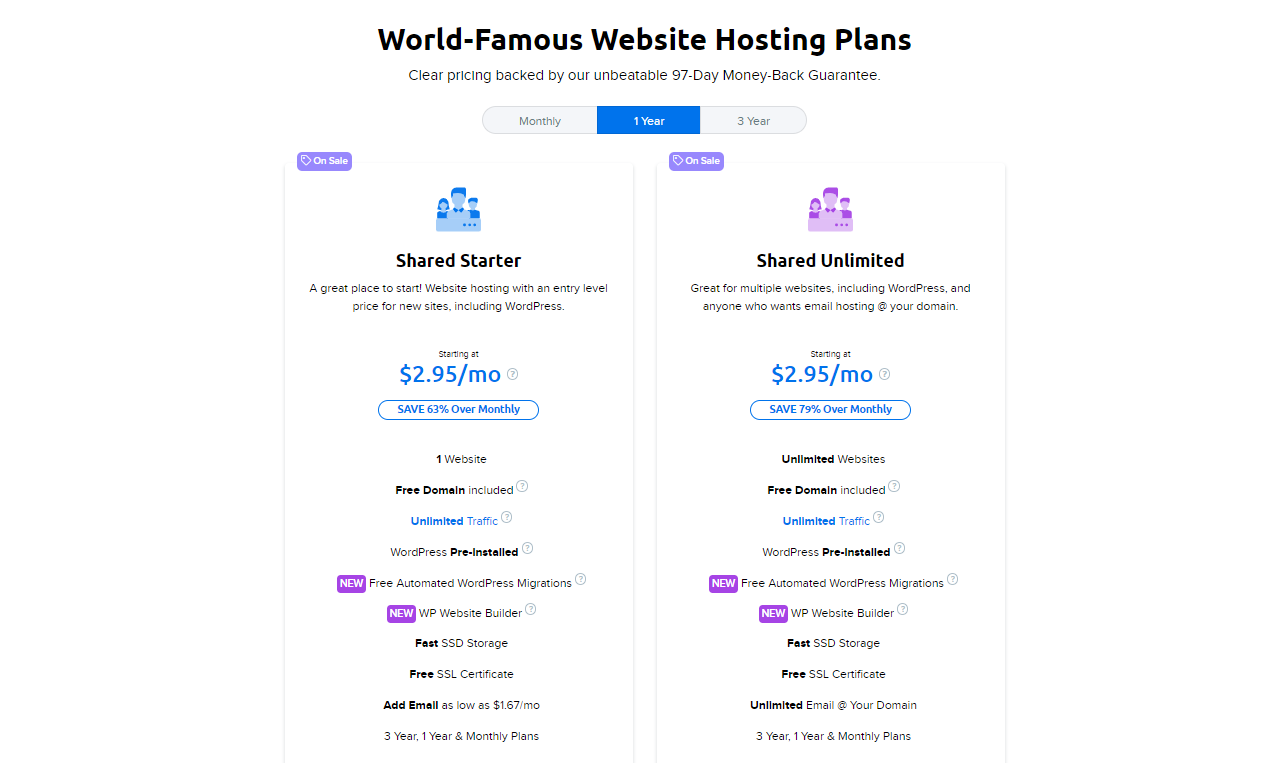Best Ecommerce Hosting Providers 2024 | The Top 5
Our independent research projects and impartial reviews are funded in part by affiliate commissions, at no extra cost to our readers. Learn more
We’ve researched and ranked the best ecommerce hosting providers to help you decide which one is the perfect match for your ecommerce business. Below, you can compare our top six providers and read in-depth reviews to help you with your decision.
Looking for the best ecommerce hosting? You’ve come to the right place.
Bluehost is the best all-around ecommerce hosting provider, scoring 4.7 out of 5 in our in-depth ecommerce hosting research. It offers excellent stability, high-quality features, and outstanding value for money. Hostinger comes in a close second place with a score of 4.5 out of 5. It’s perfect if you’re on a budget and offers a wide variety of ecommerce plugins.
Putting our personal experiences alongside our extensive research, we’ll cover everything you need to know about ecommerce hosting providers, and we’ll help guide you through the decision-making process until you’re all set to go!
According to their performance in key categories such as pricing, features, and customer support, we’ve narrowed the options down to a list of the five best ecommerce hosting providers. Below, we’ll take a deep dive into each one.
5 Best Ecommerce Hosting Providers
- Bluehost – Best ecommerce hosting provider overall
- Hostinger – Great ecommerce plugins
- SiteGround – Best alternative for startup sellers
- DreamHost – Best for performance
- GoDaddy Hosting – Great help and support services
Using our carefully conducted research, this article will tell you exactly what you need to know about each of these providers, from features to pricing and beyond.
In this case, we’ve focused our ecommerce hosting research on five key areas:
- Pricing
- Performance
- Features
- Help and support
- Market analysis
For ecommerce hosting providers, we know that features and performance are important factors for selling online, so we’ve paid extra attention to those categories in our analysis. Our in-depth and thorough research process means we can provide you with a fair list of providers, so you can feel prepped and ready to make the right decision.
#1. Bluehost – Best Ecommerce Hosting Provider Overall
Bluehost
Best ecommerce hosting provider overall
- Great for WordPress
- Reliable support
- Dedicated ecommerce plans
Paid Plans: $2.95 - $119.99 / month
Pros
-
24/7 phone and live chat
-
Excellent WordPress integration
-
Best value price for dedicated hosting
Cons
-
No green hosting
-
Unreliable site speed
-
Limited backups for cheaper plans
Features
Scoring 4.7 out of 5 overall in our ecommerce hosting research, Bluehost’s 99.98% uptime comes out to about one hour and 45 minutes of downtime per year, which is pretty close to perfect. Good uptime is vital for online stores in particular, because time is literally money – the longer your site is down, the longer you’ll be losing out on sales.
Despite its great uptime, Bluehost does fall down slightly in the features category. We score it 3.5 out of 5, which is a slight boost from its previous score of 3.2 out of 5 in 2021! This is mostly because Bluehost doesn’t offer free backups on its cheapest plan, which means if you ever have to restore your site, you may not have the most recent version backed up and ready to hand. Additionally, even though it’s great for those building a store with WooCommerce, it doesn’t support Magento or other ecommerce platforms, restricting your options.
However, Bluehost does have a good showing on its mid-tier plans, which are ideal for newer online stores. Bluehost’s Plus shared plan ($5.45 per month) comes with unlimited SSD storage, unmetered bandwidth, and unlimited websites, giving you plenty of room to grow.
Bluehost really stands out from the crowd when it comes to making WordPress sites.
In fact, it’s the number one provider recommended by WordPress itself, and one-click installations mean it couldn’t be easier to set up a WordPress site through Bluehost. WordPress’ WooCommerce plugin lets you fully customize your online store, and Bluehost’s basic WooCommerce plan ($9.95/month) includes a pre-installed Storefront Theme, 100GB of SSD storage, and a free two-hour setup call with a WooCommerce expert – so you’ll have all the support you need to get your store looking professional.
Support & Security
Bluehost’s customer service options range from email tickets to 24/7 phone and live chat support. For ecommerce hosting, it’s our top choice for help and support with a score of 4.6 out of 5.
As far as security goes, Bluehost provides a free SSL certificate, Spam Assassin protection, hotlink protection, and Secure Shell access (SSH). By signing up to a Bluehost plan, you’ll be ensuring that your site has all of the standard protection measures in place.
Since you’ll be running an ecommerce site where visitors will be sharing personal information, you might be thinking about moving your security measures up a notch. With Bluehost, you can do so by purchasing SiteLock Find for $35.88/year, which scans your website for malware and provides peace of mind for both you and your customers.
Pricing
Bluehost has an overall value for money score of 4.7 out of 5. That’s because it offers plenty of hosting types and has great features for the price you pay. For ecommerce, it has the joint third-best value score of 3.2 out of 5, which means it’s fairly easy on your wallet, especially if you’re on a budget. If you’re starting an online store with Bluehost, we recommend using the WordPress eCommerce plans because they offer seamless integration with the WooCommerce plugin.
There are two WordPress eCommerce plans to choose from, which range from $9.95 to $12.95 per month. Of those, we recommend starting with the Online Store plan, which only costs $9.95 per month if you commit to a 12-month contract.
While the Standard plan only offers 100GB of SSD storage, as opposed to the 200 GB SSD storage of the upgraded WooCommerce plan, this storage should be more than enough to get a new store up and running smoothly.
Bluehost also offers the industry standard 30-day money-back guarantee so, regardless of which plan you’re leaning towards, you can test it out stress-free.
Bluehost Gallery

Further Information
- Bluehost Review: Read our review and discover if Bluehost is the ideal provider for your online store.
- Best WordPress Hosts: Is your store built on WordPress? Read about the best WordPress hosts in our in-depth review.
- Bluehost vs HostGator: Torn between HostGator and Bluehost? We’ve got your back – find the best one for you in our comparison.
#2. Hostinger – Best Ecommerce Plugins
Hostinger
Best ecommerce plugins
- Great value for money
- Stable site speed
- Free migration
Paid Plans: $2.99 - $109.99 / month
Pros
-
Cheap introductory prices
-
Wide range of VPS plans
-
30-day money-back guarantee
Cons
-
No dedicated hosting
-
Storage space limitations
-
No green hosting
Features
In second place, we have Hostinger with an overall ecommerce hosting score of 4.5 out of 5. It’s an affordable and strong provider, and for its features alone, Hostinger scores a grand 3.8 out of 5. This makes it the best in this list, and that’s largely down to how many features you get for the low price point you pay!
You can choose from its shared, VPS, and WordPress hosting plans, but if you’re looking for further growth, you’ll be limited by Hostinger’s lack of dedicated hosting plans. That being said, Hostinger’s VPS plans are advanced and feature-rich, so any small or even medium-sized stores shouldn’t face any hurdles when scaling up.
Looking at Hostinger’s shared plan features, the Business plan is fully optimized for WooCommerce and your website can make use of unlimited bandwidth and databases, up to 200GB of storage, daily backups, and a free domain. Each plan upgrade will equip your store with more scale and greater tools.
And don’t worry if you’re still unsure! Hostinger’s plans come with a 30-day money-back guarantee, so you don’t have to commit right away.
Support & Security
When it comes to help and support, Hostinger scores a disappointing 2.8 out of 5 – the worst option out of the six providers. This is because it offers so few support options, making it tricky to get in touch with someone should you need to. If reliable and flexible support services are important, you’d be better off choosing Bluehost or InMotion.
Having said that, Hostinger doesn’t leave you completely on your own. It does offer a live chat service, and users can get in touch via email. But there’s no phone line in case you want to speak to a human about your issues.
If you’re happy searching for solutions on your own, Hostinger’s website is home to a Knowledge Base and tutorials on all things web hosting, so it shouldn’t be too hard to find an answer to your query.
In terms of security, all of Hostinger’s plans come with helpful features, such as unlimited free SSL, Cloudflare-protected nameservers, automated backups, and IP blockers. This means you can feel confident that your website and your customers’ data is secure.
Pricing
Hostinger scores 3.9 out of 5, coming joint first for pricing with SiteGround. If cost-effective and budget-friendly hosting plans are what you’re looking for, Hostinger is a great option since its cheapest shared hosting plan starts at just $2.99 per month (for 12 months). However, for an ecommerce store, we’d recommend choosing Hostinger’s Business Shared Hosting plan for $3.99 per month – it offers the best features for small and medium-sized businesses.
Compared to our number one provider, Bluehost, Hostinger is an affordable alternative, but you’ll sacrifice some features and tools for the cheap price. For example, Hostinger’s cheapest plan doesn’t come with a free domain, and it only has 100GB of bandwidth in comparison to Bluehost’s unmetered bandwidth. But, if you’re looking for more power, Hostinger’s VPS plans are also budget-friendly, ranging from $6.49 to $19.99 per month (for 12 months).
Hostinger Gallery

Further Information
- Hostinger Review: Read our full review of the hosting provider where we tackle everything you need to know about Hostinger.
- Hostinger Pricing: For a detailed look at Hostinger’s pricing and various plans.
#3. SiteGround – Best Alternative for Startup Sellers
SiteGround
Best alternative for startup sellers
- Excellent for support
- Limited hosting types
- WooCommerce plans
Paid Plans: $2.99 - $400 / month
Pros
-
Auto-install of ecommerce apps
-
Automatic WordPress updates
-
99.98% uptime guarantee
Cons
-
No VPS or dedicated plans
-
Better options for WordPress
-
Limited storage on cheap plans
Features
Rounding out the top three is SiteGround. SiteGround’s auto-installation is a lifesaver that makes the setup process much easier for you, while Content Discovery Networks (CDNs), like Cloudflare, improve site speed and make your visitors happy.
SiteGround’s ecommerce plans also offer free shopping carts (installation included), free eShop transfer, and an eCommerce Optimized Server. Multiple server locations across three continents mean better site speed for visitors the world over, while unmetered data transfer ensures scalability as your site grows.
Although SiteGround isn’t lacking in features, In our testing, it scores a middle-of-the-road 3 out of 5. It still offers plenty, but there are more feature-rich providers out there. For example, on its cheapest plan, it only offers 10 GB storage, whereas Hostinger offers 100 GB.
If impressive features are a selling point for you, we’d recommend an alternative provider, such as Hostinger or GoDaddy Hosting.
SiteGround’s uptime guarantee is around 99.98% – a very impressive uptime that converts to about one hour and 45 minutes of downtime per year. For an ecommerce site, you’ll want to keep that window as tiny as possible – every minute your site is down is a minute where you aren’t making any sales! Thankfully, under two hours is very reassuring.
Support & Security
SiteGround’s knowledge base and 24/7 phone and live chat support put it on par with DreamHost in terms of customer service, scoring 3.8 out of 5 in our help and support testing. This means it’s not quite as good as Bluehost, but it sits in a comfortable joint second place. If you ever experience any issues with your hosting, you can rest easy – SiteGround will be there to help. But what about security?
SiteGround supplies the usual free Let’s Encrypt SSL certificate, but it also has an in-house monitoring system that checks your server status every half second, to detect and automatically fix any ongoing issues and prevent future problems. This is very impressive and is something that Bluehost doesn’t offer. SiteGround also has advanced spam protection at no additional cost, which provides a filter for incoming and outgoing email messages.
Pricing
SiteGround is a great option to consider if you’ve built your store using WordPress’ WooCommerce plugin. There are three price plans to choose from, and prices start at $2.99 per month when you commit to a one-year plan.
The StartUp WooCommerce plan is SiteGround’s cheapest plan with ecommerce capabilities. The StartUp plan is only suitable for very small stores that aren’t really walking (or selling) yet, so we recommend skipping straight to either the $4.99 per month GrowBig plan, or the $6.99 per month GoGeek plan. While slightly pricier, both of these plans provide scalable features, like PCI-compliant servers and SuperCacher for better site speeds, which will provide a better experience for your customers.
When you sign up for any SiteGround plan, you’re entitled to its 30-day money-back guarantee. This makes trying out SiteGround a low-risk option – and potentially high reward, too!
SiteGround Gallery

Further Information
- SiteGround Review: Read our full review for more information on this reliable provider.
#4. DreamHost – Best for Performance
DreamHost
Best for performance
- Top site speed + uptime
- Good for shared hosting
- Lacking in support
Paid Plans: $2.95 - $379 / month
Pros
-
Free daily backups
-
Free WordPress migrations
-
Unlimited storage and bandwidth
Cons
-
Low score for features
-
No 24/7 or direct phone support
-
Only supports one store across all plans
Features
DreamHost performs pretty poorly in the features category and, as a result, it scores an unappealing 2.8 out of 5 – the lowest ecommerce features score in our list of six providers. This is because its feature offering is uninspiring, with lackluster storage space that feels restrictive when considered against the price of its WooCommerce plans.
However, DreamHost does provide “unlimited traffic” on every plan, which just means that it doesn’t track bandwidth or traffic, so you won’t be charged for exceeding any certain amount. This isn’t so different from the “unmetered bandwidth” that you’ll see from a lot of other providers, and it means that your site won’t be punished for growing! Because of this, and despite disappointments in other areas, it receives an ecommerce hosting score of 4.3 out of 5.
Additionally, DreamHost has the best performance score of any provider on this list – 4.2 out of 5. So, even though its features are a disappointment, your website is in reliable and stable hands.
DreamHost also provides free daily backups on all of its plans, which can be a lifesaver if you’re just starting out because you won’t have to worry about losing all of your progress from one mistake. Domain names come free for the first year when you register a .com, .org, .club, .net, or .info domain, and unlimited email is included on every plan. However, its plans don’t include a dedicated IP address, which will be an added cost to consider.
DreamHost’s shared plans are a decent option, coming third overall in our shared hosting research, but DreamHost is let down by its unimpressive VPS, dedicated, and WordPress-managed hosting plans.
Alongside these hosting routes, DreamHost also offers WooCommerce-specific plans. These are tailored to support online stores, and the cheapest DreamPress plan comes with unlimited email, WooCommerce pre-installed, 30GB of storage, and on-demand backups in addition to the usual daily ones. DreamHost doesn’t track traffic, but it does recommend the DreamPress plan for no more than 100k monthly visitors. If you exceed this, your store won’t be shut down, but your performance might just be slightly reduced, meaning your customers’ experience could suffer.
It is worth noting that DreamHost only supports WooCommerce. It doesn’t have a Magento-specific plan, and it also isn’t compatible with other shopping cart software, such as OpenCart.
Support & Security
DreamHost’s customer support has improved significantly since our previous research. Where it once only scored 2.5 out of 5 in our research, DreamHost is now on par with SiteGround with a help and support score of 3.8 out of 5. Despite the increase in score, there are still stronger providers out there, such as Bluehost, if support is a key factor for you.
With DreamHost, you can’t contact support directly over the phone. The support team can call you back in response to a query, but you can’t reach out first, which can be annoying if your concern is urgent. Instead, DreamHost’s live chat function is available from 3:00am to 9:30pm PST, seven days a week, although you may have to wait a bit during peak times.
On a positive note, DreamHost’s security measures are more impressive than its customer support. Every DreamHost plan comes with the industry standard of a free SSL certificate, but you also get access to DreamHost’s internally built (and pretty self-explanatory) malware remover, which finds and fixes malware on your site, protecting your website and keeping it running at its best.
Pricing

Although not bad value for money, DreamHost also isn’t the best of the bunch. It scores 3 out of 5 in our pricing research, ranking it last out of the five platforms we’ve explored. This is because its ecommerce-focused WooCommerce plans can be pretty expensive, starting from $16.95 per month. And if you want more storage and greater traffic capacity, you could be looking at as much as $71.95 per month with its most expensive DreamPress Pro plan.
Of course, you don’t need to start out on the WooCommerce-specific plan, especially if your store is only small. In this case, one of DreamHost’s shared plans will do. For a 12-month contract, the two plans both start at $2.95 per month, so we’d recommend starting on the larger Shared Unlimited plan. It has everything you’ll need: unlimited traffic, WordPress pre-installed, fast SSD storage, and unlimited email @ your domain.
The cheaper Shared Starter plan has most of these features, but you’ll have to pay an additional $1.67 per month for email hosting – and the cost of Shared Starter plus $1.67 per month means you’ll be paying more than the Shared Unlimited plan.
DreamHost offers a 97-day money-back guarantee, but note that this only applies to credit and debit card payments made for shared hosting plans – which, if you’re just starting out with DreamHost, will probably include you! If, however, you fall outside of these terms, you’ll only get 30 days to change your mind.
DreamHost Gallery

Further Information
- DreamHost Review: Read our detailed review for more information on this provider.
#5. GoDaddy Hosting – Great Help and Support Services
GoDaddy
Great help and support services
- Good performance
- 24/7 live chat and phone
- Good server response time
Paid Plans: $6.99 - $469.99 / month
Pros
-
Free daily backups
-
Reliable security
-
Unmetered bandwidth
Cons
-
Expensive pricing plans
-
Poor uptime of 99%
-
Poor site speed
Features
While GoDaddy Hosting is tied for fifth place with Dreamhost thanks to its overall ecommerce hosting score of 4.3 out of 5, it sits firmly in the middle of the pack for its features. Scoring 3.6 out of 5 in this category, it does the job well, and GoDaddy’s shared hosting plans offer what you would expect, such as unmetered bandwidth, daily backups, free domain, and free SSL certificates.
However, the benefits increase with each paid plan, so you’ll need to shell out more if you want greater features. For example, GoDaddy’s basic Economy shared hosting plan offers a small 25GB of storage and the capacity for one website, whereas the Maximum plan comes with 100GB of storage, 50 websites, and 100 databases. You may choose to upgrade if you’re running a larger store or looking to grow quickly.
Unfortunately, our testing found that GoDaddy has poor site speed, which could deter customers from sticking around too long. However, it did perform very well during our server response time testing, beating the other six providers in this list. This means that, although your website pages might take a while to load, your online store can process customer requests very quickly, minimizing the time they’re kept waiting.
Support & Security
GoDaddy Hosting’s help and support has really improved over time. Presently, GoDaddy offers 24/7 live chat and phone services, but no email support, which lets the provider down in comparison with others, such as Bluehost. That being said, GoDaddy still scores very highly in our help and support testing, with a strong 4 out of 5. Despite its position on this list, GoDaddy Hosting sits just behind the two leaders when it comes to support, so don’t rule the provider out if this is an important area for you.
As we’ve already mentioned, daily backups and a free SSL certificate already bring great peace of mind when it comes to hosting security. GoDaddy also runs its own monitoring unit to keep an eye on suspicious activity and prevent potential cyber attacks, so you can be safe in the knowledge that your online store is protected.
Pricing
When you look at value for money scores, GoDaddy Hosting and Bluehost both score the same: 3.2 out of 5. However, when you compare their overall ecommerce score, Bluehost soars ahead with 4.7 out of 5, while GoDaddy lags behind with a score of 4.3 out of 5. Why? It all comes down to the fact that GoDaddy’s shared and dedicated hosting plans are fairly expensive, with shared plans starting at $6.99 for a 12-month contract – considerably more than introductory costs from other hosting providers.
Ultimately, the longer you commit, the cheaper the price will be, but GoDaddy isn’t the ideal choice if value for money is key to your hosting needs. For that, you’d be better off looking at Hostinger or SiteGround. Additionally, pricing between hosting plans and types is all over the place, which can make choosing an initial plan difficult.
GoDaddy Gallery

Further Information
- GoDaddy Hosting Review: Read our full review on GoDaddy Hosting for more information.
- GoDaddy Website Builder Review: GoDaddy is a great comprehensive solution thanks to its website builder capabilities.
Hosted Ecommerce Platforms
If you haven’t built your online store yet, we hope our list of the top five ecommerce hosting providers has offered some inspiration. However, finding hosting doesn’t have to be part of setting up your ecommerce business.
Intrigued? Well, you should be! If the thought of finding a hosting provider and choosing the right hosting package is making your head hurt, there’s a simpler solution – hosted ecommerce website builders. With this model, your website-building platform will host your store for you, rather than you having to source your own hosting.
Think of it like a website builder and hosting platform rolled into one!
Hosted ecommerce platforms are best for beginners because you don’t have to spare a single thought for your hosting. Even if you’re a hosting pro, these platforms can save you time and even money.
Easy to budget for, easy to use, and easy to run once set up – they’re ideal for the busy business owner.
Just like the hosting providers above, we took the time to research and test each one ourselves. Not only that, we also got people just like you to test them for us and give us their feedback. Sure, they’re not for everyone but, if they sound like they could be for you, then here’s a quick look at the top three:
Wix eCommerce
Wix is the best all-around ecommerce platform on the market. You’ve probably heard of Wix because of its website builder functions, but you can also build a beautiful online store using one of its ecommerce plans, which start at $27 per month (billed yearly.)
It receives an ecommerce score of 4.7 out of 5, thanks to getting the best website feature score of 4.4 out of 5. It comes with great quality features, the best SEO, marketing tools, and the best apps to boost your store. On the other hand it’s not the most powerful ecommerce platform on the market, and has pretty poor storage – good to keep in mind if you need plenty of storage.
Further Information
- Wix eCommerce Review: Read our full review to discover how this website builder could benefit your online brand.
Shopify
Shopify is ideal if you have a growing or larger business – coming in just behind Wix with an ecommerce score of 4.6 out of 5. It lets you choose a template that matches your industry, design your storefront, customize your settings, add products to your store, and even add extra apps for more power. Prices range from $29 to $299 per month.
Shopify has the highest sales feature score of 4.5 out of 5, along with the best customer score of 4.7 out of 5. It’s popular because of good security features, multi-channel integration, over 100 payment options, and its top-rated Big Data reporting tools.
Further Information
- Shopify Review: Read our full review to find out if this could be the perfect platform for your online store.
Squarespace
Squarespace offers the easiest builder to use when it comes to ecommerce platforms, and it’s certainly a top player when it comes to creative control. Its beautiful templates make it easy to design a stylish store and showcase your products, no matter your skill level. Its prices range from $23 to $49 per month (billed annually).
It scores 4.5 out of 5 overall for ecommerce, excelling in ease of use, design and value for money. Squarespace shines in UX design (user experience design), stunning templates, and omnichannel design – along with some of the best website features.
Further Information
- Squarespace Ecommerce Review: Read our full review to learn more about this stylish, easy-to-use online store builder.
Best Ecommerce Hosting Providers: Summary
This article has broken down the best ecommerce hosting providers, with details to help you decide which one is best for your online store. Choosing the right ecommerce hosting couldn’t be more important – you need a speedy, reliable provider with good support and features to help your store succeed. This is why we’ve rated Bluehost as our number one choice.
Sadly, your customers will never compliment you on your hosting but, make no mistake, it is the invisible force encouraging them to buy from you rather than your competitors. Slow loading pages or site crashes will lose you sales, but a solid hosting provider will have your customers coming back again and again.
Here’s another look at our top five choices for ecommerce hosting:
- Bluehost – Best ecommerce hosting provider overall
- Hostinger – Great ecommerce plugins
- SiteGround – Best alternative for startup sellers
- DreamHost – Best for performance
- GoDaddy Hosting – Great help and support services
You can’t go wrong with Bluehost, especially on account of its stellar customer service, quality features, and excellent value for money. However, if features and additional plugins are your top priority – and that’s a perfectly logical top priority – then Hostinger will be a great fit. If you’re most concerned with guaranteeing a reliable service, DreamHost is the best option for performance.
On the other hand, some people don’t have the time, money, or technical know-how to choose an ecommerce hosting provider and build a store from scratch – and that’s okay! There are other platforms that will host your store for you. You can build, manage, and grow your store all in one place, under one price, keeping it simple but no less effective. The best of these platforms is Wix, which combines power with ease of use.
Give your store a solid foundation with one of these top ecommerce hosting providers, and say hello to fast site speeds and soaring sales!
Best Ecommerce Hosting Providers: FAQs
Find out more in our full Shopify Review.
Website Builder Expert aims to provide you with honest data. That’s why we conduct our own research and obtain direct, personal insight.








4 comments